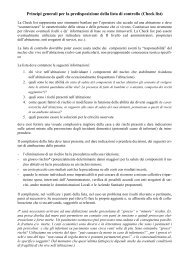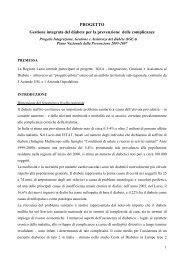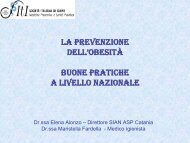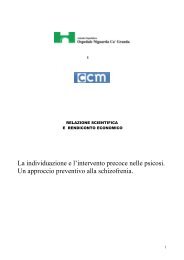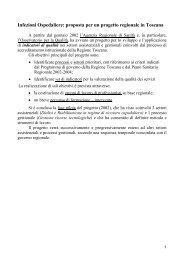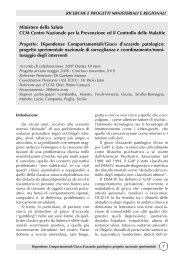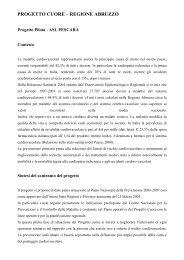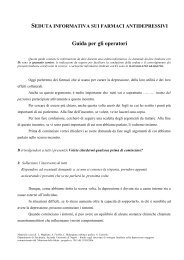Gaining health : analysis of policy development in European ...
Gaining health : analysis of policy development in European ...
Gaining health : analysis of policy development in European ...
You also want an ePaper? Increase the reach of your titles
YUMPU automatically turns print PDFs into web optimized ePapers that Google loves.
Chapter 4<br />
196<br />
iour <strong>of</strong> schoolchildren. The “CINDI team” was active <strong>in</strong> the<br />
<strong>development</strong> <strong>of</strong> the overall <strong>health</strong> <strong>policy</strong> and numerous<br />
related <strong>health</strong> <strong>policy</strong> <strong>development</strong> activities.<br />
As a new member <strong>of</strong> the EU, Lithuania is also exam<strong>in</strong><strong>in</strong>g<br />
some <strong>of</strong> the implications and potential <strong>in</strong>fluence <strong>of</strong> EU<br />
membership on <strong>health</strong> <strong>policy</strong>.<br />
2.1.5. F<strong>in</strong>d<strong>in</strong>g solutions<br />
The National Plan for Health is approved by Parliament.<br />
The executive function is assigned to the M<strong>in</strong>istry <strong>of</strong> Health,<br />
while monitor<strong>in</strong>g and evaluation is the task <strong>of</strong> the National<br />
Board <strong>of</strong> Health. The National Board <strong>of</strong> Health provides<br />
strategic direction. A system <strong>of</strong> accreditation is <strong>in</strong> place<br />
for public <strong>health</strong> services, as are “norms” for services and<br />
activities. Such norms are agreed through collaboration<br />
among the M<strong>in</strong>istry <strong>of</strong> Health, the Lithuanian Public Health<br />
Association and pr<strong>of</strong>essional organizations.<br />
There is a comb<strong>in</strong>ation <strong>of</strong> policies directed both at the<br />
whole population and specifically at high-risk groups.<br />
Bus<strong>in</strong>ess and <strong>in</strong>dustry, but particularly NGOs, are seen as<br />
hav<strong>in</strong>g an important role. S<strong>in</strong>ce the rega<strong>in</strong><strong>in</strong>g <strong>of</strong> <strong>in</strong>dependence,<br />
the voluntary sector has considerably expanded.<br />
There are now over 400 registered NGOs that are<br />
concerned <strong>in</strong> some way with <strong>health</strong> issues. L<strong>in</strong>ks have been<br />
made to the EU-funded project organized by the <strong>European</strong><br />
Public Health Alliance for capacity build<strong>in</strong>g and the<br />
network<strong>in</strong>g <strong>of</strong> public <strong>health</strong> NGOs across Europe. S<strong>in</strong>ce<br />
there is some concern among NGOs that their views are<br />
not given sufficient visibility, many are com<strong>in</strong>g together <strong>in</strong><br />
umbrella coalitions to strengthen their <strong>in</strong>fluence.<br />
Lithuania also participates <strong>in</strong> the EU’s HIA project, with<strong>in</strong><br />
whose framework a case study on the impact <strong>of</strong> transport<br />
<strong>policy</strong> and air pollution on <strong>health</strong> has been developed.<br />
Apart from this, the <strong>development</strong> <strong>of</strong> HIA is still rather<br />
primitive. There is no legal or regulatory framework for HIA<br />
yet, although the M<strong>in</strong>istry <strong>of</strong> Justice has decreed that legislation<br />
should be checked for its possible <strong>health</strong> impact. S<strong>in</strong>ce<br />
this is carried out by legal rather than <strong>health</strong> pr<strong>of</strong>essionals,<br />
however, it is said to lead to a simple record<strong>in</strong>g <strong>of</strong> “no negative<br />
impact foreseen.”<br />
Although EU l<strong>in</strong>ks may still be at an embryonic stage, it appears<br />
that, as <strong>in</strong> the past, the door is wide open to shar<strong>in</strong>g<br />
experiences on an <strong>in</strong>ternational level.<br />
On a domestic and local level, the Health Economics<br />
Centre, which is a private company, has <strong>in</strong>itiated a project<br />
funded by the Open Society, on “Public debates as a tool<br />
to achieve susta<strong>in</strong>able <strong>health</strong> care <strong>development</strong> <strong>in</strong> Lithuania”.<br />
Through this project, <strong>health</strong>-<strong>policy</strong>-related issues are<br />
discussed, such as who w<strong>in</strong>s and who loses through <strong>health</strong><br />
care reform, how family doctors should be paid, and whether<br />
“un<strong>of</strong>ficial payment” <strong>in</strong> the <strong>health</strong> care system should be<br />
considered corruption. These discussions, <strong>in</strong>volv<strong>in</strong>g <strong>health</strong><br />
care managers and providers, patients and politicians, are<br />
<strong>in</strong>tended to come up with suggestions that reflect more<br />
fully the <strong>in</strong>terests <strong>of</strong> the population.<br />
2.1.6. Structures and processes for implementation<br />
The National Board <strong>of</strong> Health is responsible for monitor<strong>in</strong>g<br />
the implementation <strong>of</strong> the Lithuanian Health Programme<br />
and policies for disease prevention and alcohol and tobacco<br />
control. The Parliamentary Health Committee also plays an<br />
active part <strong>in</strong> scrut<strong>in</strong>iz<strong>in</strong>g progress.<br />
The Board meets about once a month to discuss approved<br />
programmes, mak<strong>in</strong>g the medical community and the public<br />
aware <strong>of</strong> implementation challenges. For example, a Board<br />
task force exam<strong>in</strong>ed all vertical programmes, conclud<strong>in</strong>g<br />
that these were not as effective as expected and needed<br />
better <strong>in</strong>tegration. A more <strong>in</strong>tegrated strategy for implementation<br />
<strong>of</strong> the overall <strong>health</strong> plan was therefore agreed.<br />
Case studies: <strong>policy</strong> <strong>development</strong> <strong>in</strong> countries for tackl<strong>in</strong>g noncommunicable diseases



